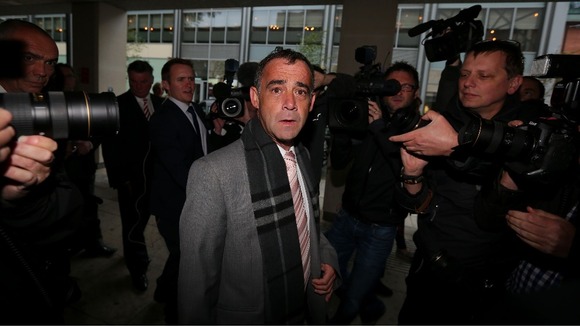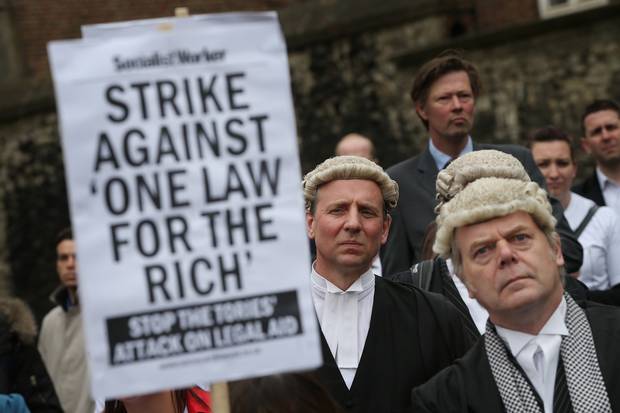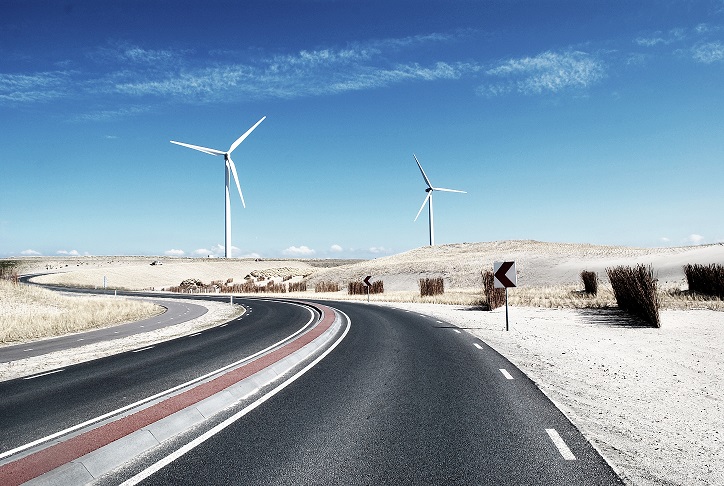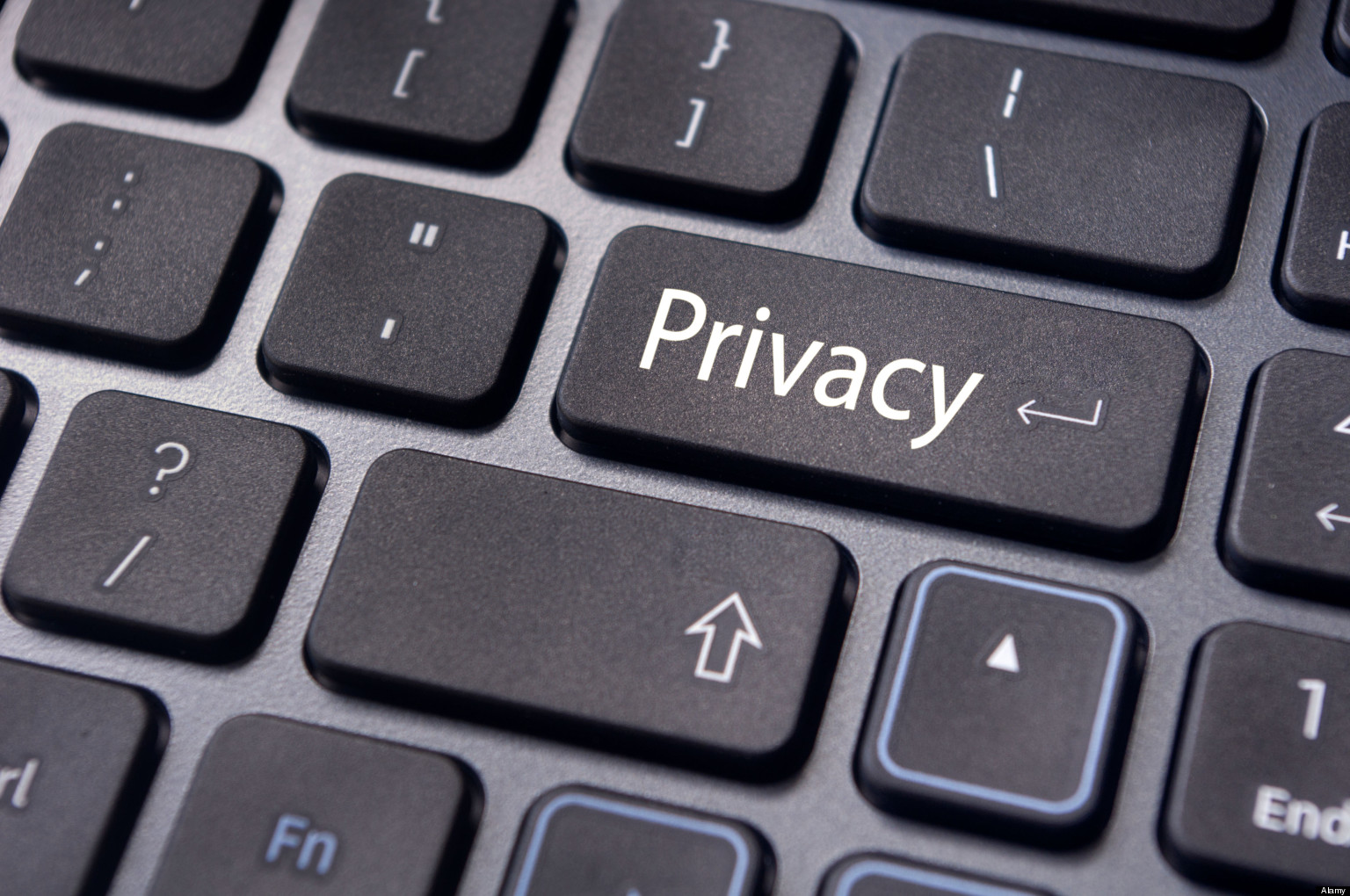 (Image source: http://www.itv.com/news/granada/update/2013-09-02/coronation-street-actor-michael-le-vell-arrives-at-manchester-crown-court-to-face-trial-for-a-series-of-child-sex-offences/)
(Image source: http://www.itv.com/news/granada/update/2013-09-02/coronation-street-actor-michael-le-vell-arrives-at-manchester-crown-court-to-face-trial-for-a-series-of-child-sex-offences/)
– Jessica Randell (LLB Law, Newcastle University) j.m.randell@ncl.ac.uk
In England and Wales a suspect in criminal law is supposedly innocent until proven guilty. This has been emphasised by the introduction of this right in the European Convention of Human Rights and Fundamental Freedoms (ECHR), article 6(2), as incorporated into domestic law by the Human Rights Act 1998. However, in practice, this process rarely occurs. With details of accusations, the trial and personal details regarding the suspect banded about in the media, both social and otherwise, it is less of a reality and more of an ideal. This is becoming more and more prevalent in the wake of the so-called ‘celebrity witch-hunt,’ particularly regarding allegations of sexual offences against children with famous celebrities in the dock. These include, but are by no means limited to; the children’s entertainer Jimmy Savile, Coronation Street actor Michael Le Vell and presenter Stuart Hall.
Both prior to and during the ‘celebrity’ trials that have been seen so far the media have been publishing intimate details about the alleged offences yet they are refusing to anonymise the name of the accused. Whether this is the right thing to do has divided the public but this is far from a new debate and it is, most definitely, not something that has gone unquestioned in the past. In the Sexual Offences (Amendment) Act 1976, for example, rape suspects were granted anonymity but this was later removed as it was deemed unjustified that those accused of rape should be distinguished from other criminal defendants. The complainant, on the other hand, retained their right not to be named and this too is criticised. It has even been questioned by our current coalition government as to whether this aspect of our judicial system needs changing but they too have decided to leave it untouched. Many questions arise from this. Is it fair? Should it be changed? And what are the alternatives?
A false accusation of a sexual offence can, as with most areas of law, destroy an individual’s privacy, relationships and livelihood; this much is acknowledged. Many will claim that the revealing of the defendant’s real name during a trial should be kept under wraps until a guilty verdict is reached. It is submitted that this should not occur. Our judicial system boasts about its unique approach to open justice; this allows for the monitoring of the inner workings of the system, to account for fair and accurate recordings of trials, to deter potential wrong-doers, to satisfy complainants who may need their ‘day in court’ and to generally uphold democracy. In accordance with this an open court allows for trials to be accessed by the public and the press alike and means that cases can be freely and openly reported on in the interest of the right to freedom of speech (see article 10, ECHR). Some may argue that allowing such reporting is an example of the right to free speech trumping an individual’s right to respect for their privacy (see article 8, ECHR). However, as with all collisions of these two fundamental freedoms; one will always prevail. This occurs despite their equal weighting as it is judged in light of a balancing exercise, where one will always outweigh the other, which is based on several factors; not least including those listed above.
Using the example of actor Michael Le Vell, who was recently cleared of twelve counts of sexual abuse against a child, including five counts of rape, he has suffered several personal setbacks as a result of the trial. He was suspended from his work as an actor on the soap Coronation Street for seven months prior to this verdict and his private life has been monumentally thrust into the public domain. This included releasing evidence regarding his alcoholism, extra-marital affairs and intimate details regarding his sex life. Some argue that this should never have been allowed in that it will discolour the public’s opinion of him. Furthermore, that it means we are no longer adhering to the right to remain innocent until the prosecution can prove the defendant’s guilt beyond reasonable doubt; the standard of proof in England and Wales. There is also the argument that such false accusations will not be removed from all media forms as, for example, it will remain only a simple search away in any internet search-engine. Such would only further bring these accusations to light either at the moment or at any time succeeding these events; meaning the actor is affected both now and in the future.
Despite these criticisms, pertaining specifically to celebrities, allowing for the anonymity of such defendants would incur several difficulties. These would include; determining the difference in treatment between celebrities and non-celebrities, how to distinguish between who is famous and who is not, the impact of social media exposure of personal details of those involved and the prevention of providing a publicised channel through which to encourage other complainants to come forward. The negative consequences for the innocently accused are recognised as being rife in such high profile cases; but why should the maintaining of a celebrity’s career and personal life surpass that of the average defendant?
An alternative, as has been advocated by the public, is to prevent the publication of any defendant’s details in such sexual abuse cases, whether the defendant is famous or not. This is surely unworkable in a system such as ours; what would happen to the free speech of those working in the media? How would we justify anonymising defendants in just one area of law? Would potential complainants feel this means there is perceived to be a larger number of false accusations in this particular area and how would this affect those scared to come forward?
If this was a feasible option it seems that the anonymity of rape defendants would never have been abolished, as it was, in 1988. It would have remained and simply been extended to cover all defendants in sexual abuse cases or, further, all criminal defendants. However, would it stop at just the name of the defendant being anonymised or would this extend to details of this case being kept secret? Surely it would become obvious to some people who the case concerned if all details were released bar a name? Regardless of it being a name or all details of a case only released upon a guilty verdict, with an appellate system such as ours, it would be extremely impracticable. If, for example, a defendant was found to be innocent at trial but later found guilty, upon travelling along the multiplicity of avenues awarded by our sought-after judicial system, what then occurs? If personal details were then to be released, would this include details from the very beginning of the case or limited to that appellate stage? What if the decision was then reversed again? Would this mean releasing details of a defendant only when it reaches the final stage in our system – ultimately this would be at the Supreme Court – or would this be extended to the European Court of Human Rights? If all of these questions were answered and it was deemed appropriate only to release information at the final stage of the case then further issues arise; in so far as how are students, academics and practitioners alike expected to apply and analyse the law without tracking its development as it occurs? A lack of legal certainty would no doubt ensue as there would be no indication as to how the law stood leading up to a final decision and how it could, potentially, be developed in the future.
There are alternative ways in which to adjust the system which do not involve anonymising the name of the defendant or, further, details of the trial until a guilty verdict is reached; but these too appear unlikely. They include setting a time limit on all online articles with an expiration date for them to delete themselves after the conclusion of the trial; hopefully mirroring the memory of the average reader. This would mean that information cannot be accessed in the future regarding innocent defendants. Arguably, if it is not on an individual’s criminal record then it should not be accessible on the internet. Alternatively, we could anonymise the name of the individual in any media form; leaving them only to be mentioned in the trial and in the judgement. It seems this would require some form of an injunction but appears unlikely, particularly in light of being able to post anonymously on social media websites or instead posting under your real name, along with thousands of others, with the comforting thought that it is unlikely all will be prosecuted. Finally, an update or editorial note could be added to anything published electronically or in future hard copies of newspapers, for example. This seems most likely but would not deter from the publishing of information as a trial is on-going.
These potential options would, most likely, still not be deemed appropriate by those keen to protect every aspect of the defendant’s private life. None of them offer ultimate protection for the innocent party nor do they solve the issue of unfairness in so far as the claimant remains anonymous but the defendant does not. It appears that what is desired is an all or nothing approach; all parties are named or none at all. However, it must be remembered that it is not just the falsely accused who has to endure a trial; the complainant too has to undergo fierce cross-examination, speculation and then the aftermath. The complainant may not be publically named but, post-trial, has to deal with either their abuser being acquitted or having to deal with the consequences of falsely accusing an innocent person. Some may argue any such consequences are deserved, some may not. Either way it will be the innocent party, not the complainant, who will have media reports documenting their innocence which, in any search engine or in any hard copy of a newspaper, will be the most recent news on the accusations. Le Vell, for example, has already been invited back to work and has had a barrage of support from friends, family and now the repenting press. In direct conjunction, the complainant will always have to live with the knowledge of the destruction their false accusations have, or could have, caused.
The press claim that there is a public interest in celebrities and their potential criminal activity and that justice must be seen to be done; thus celebrities do not escape media speculation surrounding legal action. It is accepted that the publicity surrounding a celebrity trial is extensive and may far out-strip that of the average defendant but, it is submitted, that a defence of public interest should exist as a means of justification for publically documenting a criminal trial. That public interest should not be in the individual as a celebrity but in that individual as a role model who has supposedly committed criminal acts. This public interest defence is not, therefore, in existence to discover sordid details about an actor’s sex life, for example, but rather to unearth the truth about accusations that have been made against them. Once acquitted, however, the falsely accused should be able to return to their normal life as best facilitated by those around them; family, friends, employers and supporters.
One will note that more questions are being asked than answered in this blog but that in itself only further evidences that this is not a cut and dry issue as purported by the public. It is all well and good to criticise our legal system but when no workable example can be proposed, that satisfies the complaints being made, it is submitted that it is clear that we are where we are for a reason. Media speculation may well make an individual defendant feel they are not being treated as innocent until proven guilty; but it must be remembered that speculation is exactly what it is. The jury are the keepers of the (prison) keys and only they will decide a verdict based on all the evidence put before them at trial; they are reminded of their duties to be independent by the Judge and are given the opportunity to relinquish those duties at the beginning of the trial. The media may seek to damage a celebrity’s reputation but it is up to the reader to make an educated opinion of the accused based upon the verdict given at trial. Only if a negative opinion of the defendant is formed prior to the verdict will the accused be guilty until proven innocent; and, after all, if they are indeed innocent then the truth will ultimately prevail.




